A Conversation with Bruce Duffie
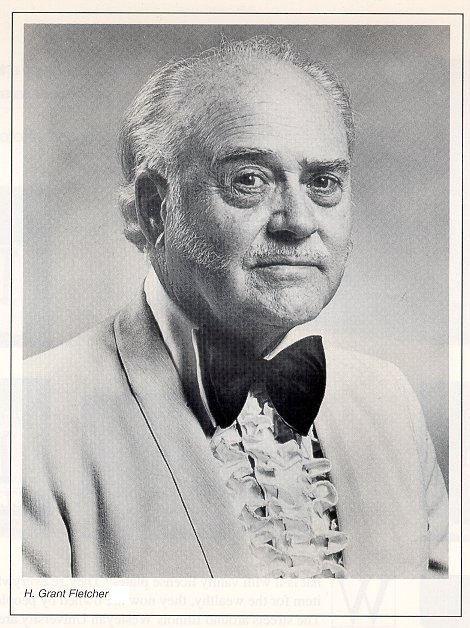

|
Horace Grant Fletcher
(October 25, 1913 in Harrisburg, IL - May 4, 2002 in Tempe, AZ) Known professionally as Grant Fletcher, both his parents were schoolteachers and musicians. His father taught elocution and physical education, and also a Kentucky Mountain Singing class, where his mother often was the accompanist. Young Grant sang in a boys choir, and at the age of fourteen began trumpet and clarinet which he learned by trial and error. He later picked up piano and violin from instruction books he borrowed from friends. While at Springfield High School (1927-32), he studied violin, theory, and choral conducting, and made his initial attempts at composing. His excellence in music brought him a special award from the Springfield High School Honors Society. From 1932-35, he studied theory, conducting and orchestration, as well as piano, viola and composition at Illinois Wesleyan University. During the summers, he was a student of conducting with Thor Johnson, and composition with Ernst Krenek at the University of Michigan, where he received his MM in 1939. His later teachers of composition included Howard Hanson, Bernard Rogers, and Herbert Elwell at the Eastman School, where he received his PhD in 1951. In 1952 he participated in a conducting symposium with the Cleveland Orchestra led by George Szell. In 1951 Fletcher was the Illinois delegate to the International Music Festival in Pittsburgh, PA, and in both 1974 and 1977 he represented United States composers at the International Triennial Festlighe Muziktage in Umer, Switzerland. Besides his musical compositions, he is the author of Rhythm - Notation and Production. His teaching positions included Illinois Wesleyan (1938-41), Winthrop College in Rock Hill, SC (1941-43), Chicago Musical College (1949-51), and finally Arizona State University in Tempe (1956-78), retiring as professor emeritus. He was Music Director and Conductor of the Akron Symphony 1945-48, and Conductor of the Chicago Sinfonietta (1952-56). Honors include First Prize in the NBC Radio Composers Contest (1938), the International Ernst Le May Award (1947), National Chamber Music Award (1973), Washington State Bicentennial Award (1976), and the Delius Festival Award (1979). -- Throughout this page, names which are links refer
to my Interviews elsewhere on my website. BD
|
| The precursor ensemble to the orchestra
was the Milwaukee Pops Orchestra, a part-time ensemble which had been founded
10 years earlier. In 1959, the orchestra formally changed its name to the
Milwaukee Symphony Orchestra, with Harry John Brown as its first music director.
During his nine-year tenure, Brown led the orchestra's transition from a semi-professional
pops group to a fully professional, full-time symphony orchestra. During the tenure of Kenneth Schermerhorn, the orchestra's second music director, from 1968 to 1980, the orchestra had begun its 'State Tour' program of concerts around Wisconsin. The orchestra also initiated its concerts for students, as well as giving its first performance at Carnegie Hall. The Milwaukee Symphony Chorus was also established during this time. Lukas Foss served as the orchestra's third music director, from 1981 to 1986, which saw a notable increase in performances of contemporary music and American compositions, along with the orchestra's first European tour in 1986. Zdenek Macal was the orchestra's fourth music director, from 1986 to 1995. The orchestra began to record for Koss Classics during this period, and established its Arts in Community Education program in 1990. From 1995 to 1997, Stanisław Skrowaczewski served as the orchestra's artistic advisor, prior to the advent of Andreas Delfs as the orchestra's fifth music director from 1997 to 2009. During his tenure, in 1999, the orchestra performed in Cuba, the first American symphony orchestra to do so since the U.S. embargo against Cuba was implemented in 1962. Edo de Waart has been the orchestra's music director since 2009. The orchestra has presented more than 100 world and American premieres of works by composers such as Philip Glass, Daron Hagen, Roberto Sierra, Gunther Schuller, William Schuman, Lukas Foss, Roy Harris, Gian Carlo Menotti, Richard Rodgers, Ottorino Respighi, Jean Sibelius, Erich Korngold and others. Over 22 compositions have been by MSO musicians. |
Natale Rosario Scalero (24 December
1870 in Moncalieri - 25 December 1954 in Ivrea) was an Italian violinist,
music teacher and composer.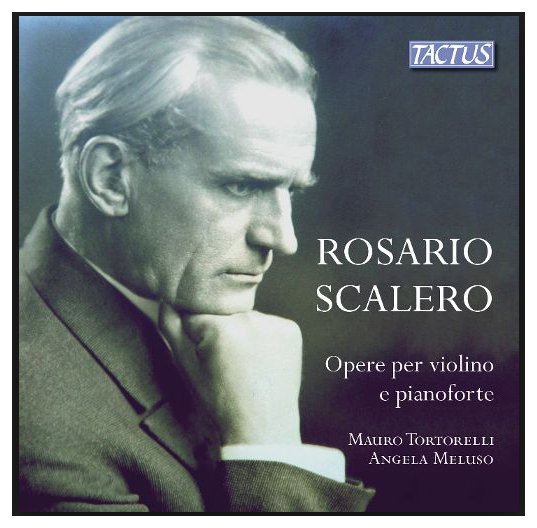 By the age of six, Scalero was under the tutelage of Pietro Bertazzi, a
violinist, musical instrument maker and instructor at the Conservatorio St.
Cecilia in Rome. In 1881, Scalero entered the Liceo Musicale di Torino under
Luigi Avalle. At the age of 15, Scalero came under the tutelage of César
Thomson. Scalero appears to have returned to his home at Moncalieri for a
time for health reasons, before returning to Torino (Turin) to study with
Camillo Sivori through 1889, appearing during this time with the Sivori Quartet.
By the age of six, Scalero was under the tutelage of Pietro Bertazzi, a
violinist, musical instrument maker and instructor at the Conservatorio St.
Cecilia in Rome. In 1881, Scalero entered the Liceo Musicale di Torino under
Luigi Avalle. At the age of 15, Scalero came under the tutelage of César
Thomson. Scalero appears to have returned to his home at Moncalieri for a
time for health reasons, before returning to Torino (Turin) to study with
Camillo Sivori through 1889, appearing during this time with the Sivori Quartet.In 1891, Scalero made his debut as a recitalist in Leipzig, following which he performed in Milan, Rome, London, and throughout Europe to critical acclaim. In 1895, Scalero went to London to study and assist violinist August Wilhelmj (concert master of the world premiere of Wagner's Ring of the Nibelungs in Bayreuth). In 1900 he left London for Vienna, where he became a composition student of Eusebius Mandyczewski. 1907 returned Scalero to Rome. Here he joined in 1913 the Società del Quartetto and became its musical director and first violinist. In 1919, he succeeded Ernest Bloch as a composition teacher at the Mannes School of Music in New York. After 1927, he taught at Curtis Institute of Music in Philadelphia, while apparently keeping a residence in Gressoney. During that time he taught composition to (among others) Samuel Barber, Leonard Bernstein, Marc Blitzstein, Lukas Foss, Leonard Kastle, Gian Carlo Menotti, George Rochberg, Nino Rota, Virgil Thomson, George Walker, Hugo Weisgall, and Luigi Zanelli. In 1946 he returned to Montestrutto, near Ivrea, where he died in 1954. |
| Historically, depth psychology (from
the German term Tiefenpsychologie),
was coined by Eugen Bleuler to refer to psychoanalytic approaches to therapy
and research which take the unconscious into account. The term was rapidly
accepted in the year of its proposal (1914) by Sigmund Freud, to cover a topographical
view of the mind in terms of different psychic systems. Depth psychology has since come to refer to the ongoing development of theories and therapies pioneered by Pierre Janet, William James, Carl Jung, as well as Freud, which explore the relationship between the conscious and the unconscious (thus including both psychoanalysis and Jungian psychology). |
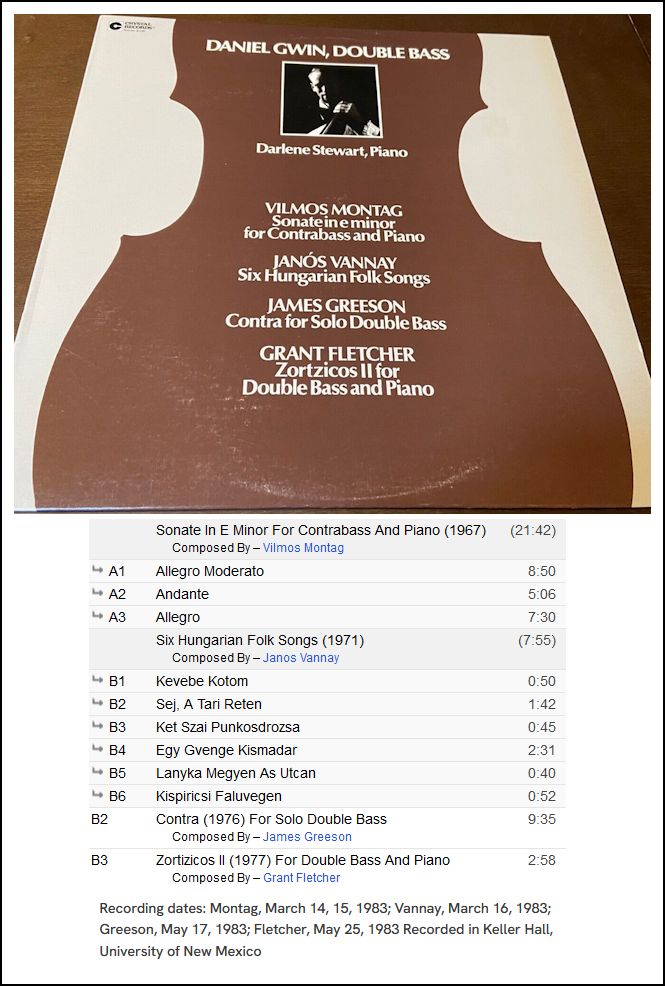
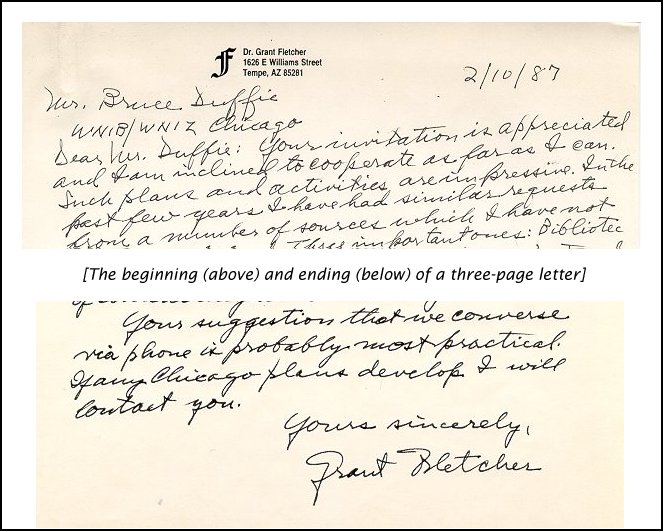
| The American Society of Composers,
Authors and Publishers (ASCAP), founded in 1914, is a not-for-profit performance-rights
organization (PRO) that protects its members' musical copyrights by monitoring
public performances of their music, whether via a broadcast or live performance,
and compensating them accordingly. ASCAP collects licensing fees from users of music created by ASCAP members, then distributes them back to its members as royalties. In effect, the arrangement is the product of a compromise. When a song is played, the user does not have to pay the copyright holder directly, nor does the music creator have to bill a radio station for use of a song. In 2012, ASCAP collected over US$941 million in licensing fees and distributed $828.7 million in royalties to its members, with an 11.6 percent operating expense ratio. As of July 2013, ASCAP membership included over 460,000 songwriters, composers, and music publishers. In the United States, ASCAP competes with two other PROs — Broadcast Music, Inc. (BMI) and the Society of European Stage Authors and Composers (SESAC). [Note: In the spirit of full disclosure, BD won the ASCAP/Deems Taylor Award in 1991. See photos of the award, which was presented by Morton Gould.] |
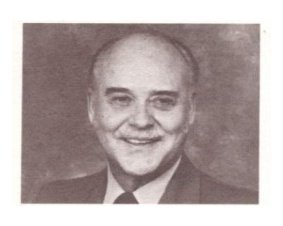 Fletcher:
Yes. This would be impossible for me because I couldn’t sit
and write the letters necessary to carry on any business. What’s more,
I doubt that I would get that much business, anyhow. I write a different
kind of music than, say, Jerome Kern. Those composers who have been
so successful are the members who are writing for the stage in Broadway today.
I don’t write that kind of music.
Fletcher:
Yes. This would be impossible for me because I couldn’t sit
and write the letters necessary to carry on any business. What’s more,
I doubt that I would get that much business, anyhow. I write a different
kind of music than, say, Jerome Kern. Those composers who have been
so successful are the members who are writing for the stage in Broadway today.
I don’t write that kind of music.John Jacob Niles (April 28, 1892
– March 1, 1980) was an American composer, singer, and collector of traditional
ballads. Called the "Dean of American Balladeers", Niles was an important
influence on the American folk music revival of the 1950s and 1960s, with
Joan Baez, Burl Ives, and Peter, Paul and Mary, among others, recording his
songs.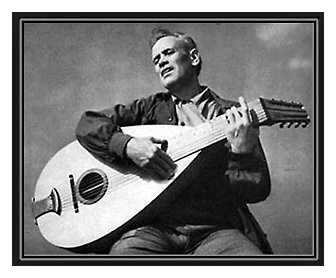 Born in Louisville, Kentucky, Niles learned music theory from his mother,
and began writing down folk music as a teenager. He became a serious student
of Appalachian folk music by transcribing traditional songs from oral sources
while an itinerant employee of the Burroughs Corporation in eastern Kentucky,
from 1910 to 1917. After serving in the U.S. Army Air Service during World
War I, in which he was injured, he studied music in France, first in Lyon,
then in Paris at the Schola Cantorum, also meeting Gertrude Stein. Returning
to the United States in 1920, he continued his studies at the Cincinnati
Conservatory of Music. He sang opera in Chicago and folk songs on early radio.
In 1925, he moved to New York City and held various jobs in the entertainment
industry. In the 1930s, he toured Europe and the United States with contralto
Marion Kerby. He performed at the White House in 1938, and on occasion at
the Newport Folk Festival during the 1950s.
Born in Louisville, Kentucky, Niles learned music theory from his mother,
and began writing down folk music as a teenager. He became a serious student
of Appalachian folk music by transcribing traditional songs from oral sources
while an itinerant employee of the Burroughs Corporation in eastern Kentucky,
from 1910 to 1917. After serving in the U.S. Army Air Service during World
War I, in which he was injured, he studied music in France, first in Lyon,
then in Paris at the Schola Cantorum, also meeting Gertrude Stein. Returning
to the United States in 1920, he continued his studies at the Cincinnati
Conservatory of Music. He sang opera in Chicago and folk songs on early radio.
In 1925, he moved to New York City and held various jobs in the entertainment
industry. In the 1930s, he toured Europe and the United States with contralto
Marion Kerby. He performed at the White House in 1938, and on occasion at
the Newport Folk Festival during the 1950s.In the 1920s, Niles began publishing music. He made four extended trips into the southern Appalachians as an assistant to photographer Doris Ulmann, again transcribing traditional songs from oral sources. On other occasions, he transcribed songs he heard sung by African Americans and by fellow soldiers in World War I. In 1936, he married Rena Lipetz. They settled on the Boot Hill farm in Clark County, Kentucky, where they spent the rest of their lives. Niles was also a noted songwriter, and many of his songs are based on traditional sources. Starting in 1938, he recorded a number of his compositions and transcribed songs, performing the material in an intense, dramatic manner. He employed a trademark very high falsetto to portray female characters, and often accompanied himself on an Appalachian dulcimer, lute, or other plucked stringed instrument. |
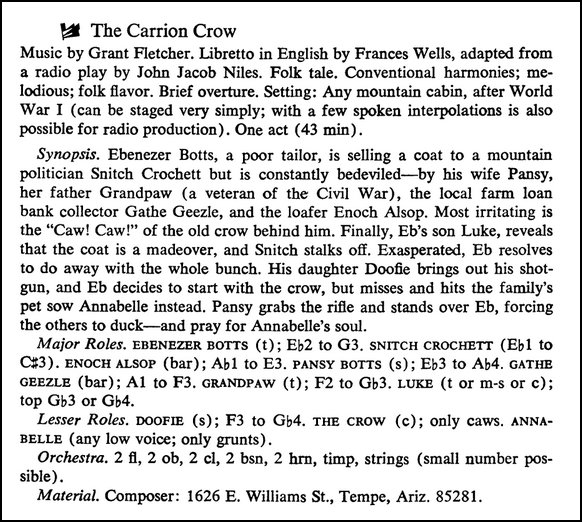 I’d known of John Jacob for years, and when I was teaching in a college
in South Carolina and driving back home to Illinois, where my wife’s home
was, we stopped off at John Jacob’s, and he showed me several of his plays
and played me a lot of his music. We had a very good get-together,
and his wife, Rena, is a wonderful person. I just love them both.
He offered me three or four items to make a short opera from, and I chose
The Carrion Crow. It is a rather
humorous story about a mountain man who is treated badly by his wife.
It’s a very lively thing. I had been teaching in South Carolina, and
I knew some of the tricks of the mountain singers. So I wrote it in
somewhat that style, and as a result, the musicians who read the score don’t
like it. They say, “This is a fallacy that we
just don’t believe in.” The man who set the
performance up said, “I didn’t like this work at all
when I looked at it, but this is tremendous! This is stage-wise, and
it’s got exciting music in it. It’s got everything!”
He became one of my best backers. Some years later he went to New
York City, and he tried six times to get a performance of this work in some
of those smaller halls. Each time he’d get people all ready, and then
the tenor couldn’t sing the role, or something else happened. Actually
I taught the role to a couple of high school students out here who could
do it well. But again, it’s a question of directorship and the kind
of background that they have, and the kind of experience that they maintain.
They don’t know anything about modern music so they don’t like it.
I’d known of John Jacob for years, and when I was teaching in a college
in South Carolina and driving back home to Illinois, where my wife’s home
was, we stopped off at John Jacob’s, and he showed me several of his plays
and played me a lot of his music. We had a very good get-together,
and his wife, Rena, is a wonderful person. I just love them both.
He offered me three or four items to make a short opera from, and I chose
The Carrion Crow. It is a rather
humorous story about a mountain man who is treated badly by his wife.
It’s a very lively thing. I had been teaching in South Carolina, and
I knew some of the tricks of the mountain singers. So I wrote it in
somewhat that style, and as a result, the musicians who read the score don’t
like it. They say, “This is a fallacy that we
just don’t believe in.” The man who set the
performance up said, “I didn’t like this work at all
when I looked at it, but this is tremendous! This is stage-wise, and
it’s got exciting music in it. It’s got everything!”
He became one of my best backers. Some years later he went to New
York City, and he tried six times to get a performance of this work in some
of those smaller halls. Each time he’d get people all ready, and then
the tenor couldn’t sing the role, or something else happened. Actually
I taught the role to a couple of high school students out here who could
do it well. But again, it’s a question of directorship and the kind
of background that they have, and the kind of experience that they maintain.
They don’t know anything about modern music so they don’t like it.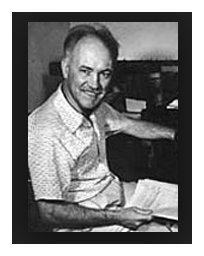 John Myers Myers was born in Northport, Long Island on January 11, 1906,
to John Caldwell Myers and Alice O'Neil McCorry Myers. He was named for his
grandfather John Myers, "the extra Myers, sparing me a dynastic 'II' as per
race horses, cars, and yachts." [For a composer
with similar nomenclature, see my Interview with Curtis
Curtis Smith. BD]
Myers grew up in various places in New York, including New Paltz and NYC.
He has stated that he knew from the time he was seven years old that he wanted
to be a writer. He attended Bard St. Stephens College and then Middlebury
College, but was expelled from the latter for writing unflattering verse about
the faculty. He later attended the University of New Mexico to study anthropology,
but never completed a degree.
John Myers Myers was born in Northport, Long Island on January 11, 1906,
to John Caldwell Myers and Alice O'Neil McCorry Myers. He was named for his
grandfather John Myers, "the extra Myers, sparing me a dynastic 'II' as per
race horses, cars, and yachts." [For a composer
with similar nomenclature, see my Interview with Curtis
Curtis Smith. BD]
Myers grew up in various places in New York, including New Paltz and NYC.
He has stated that he knew from the time he was seven years old that he wanted
to be a writer. He attended Bard St. Stephens College and then Middlebury
College, but was expelled from the latter for writing unflattering verse about
the faculty. He later attended the University of New Mexico to study anthropology,
but never completed a degree. After extensive travel through Europe and the United States, Myers worked for the New York World and San Antonio Evening News. He was also an advertising copywriter. Myers served five years in the U.S. Army during World War II. He and Charlotte Shanahan met while he was stationed at Fort Knox and they were married in 1943. They had two daughters, Anne Caldwell Myers and Celia Myers. In 1948, he moved to Tempe, Arizona to do research for The Last Chance, and stayed there as he was by that time enamored of the West. While there he worked as editorial writer for the local newspaper. At Arizona State University he had taught writing, conducted a writers conference, and assembled Western Americana for ASU Libraries. He died on October 30, 1988. Myers published seventeen books, ranging from fantasy and historical fiction of the American Old West to epic poetry and histories of the West. His nonfiction works included a history of the Alamo, the first biography of Doc Holliday, a study of the vigilante movement in San Francisco, and a well-researched biography of Hugh Glass, an early American fur trapper and frontiersman. |
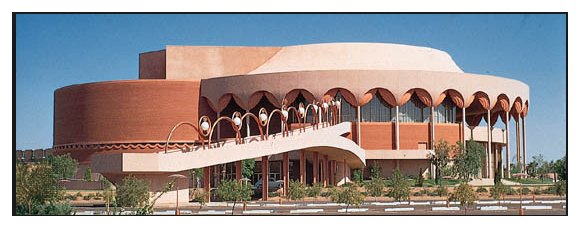
According to historical content produced by Arizona State University, the process that would eventually lead to the historic Gammage Memorial Auditorium began in 1957 when incumbent ASU President Grady Gammage desired a unique auditorium for the ASU campus. In 1956, a campus facility serving as both an auditorium and gymnasium was rendered unusable due to a collapsed roof, likely forming the first event in the chronology of the new auditorium’s development. Gammage successfully recruited friend Frank Lloyd Wright to take part in the design of the new auditorium, who would, with various budget related alterations, base its design on an opera house that he had conceptualized for the city of Baghdad, Iraq sometime prior upon the invitation of King Faisal II. All intentions for the Baghdad opera house, a feature of the Plan for Greater Baghdad, were effectively abandoned after the King's assassination in the 14 July Revolution. Wright is also said to be responsible for the 1200 South Forest Avenue location of the circular auditorium, a site which was then occupied by an athletic field, and earlier by G.I. housing units. Wright’s contribution to the blueprint of the concert hall seized upon his death in 1959 (coincidentally the same year Grady Gammage expired), leaving protégé William Wesley Peters to undertake its completion. Spearheaded by the R.E. McKee Company, construction of the facility commenced in 1962 and completed twenty-five months later, officially opening on September 18, 1964. 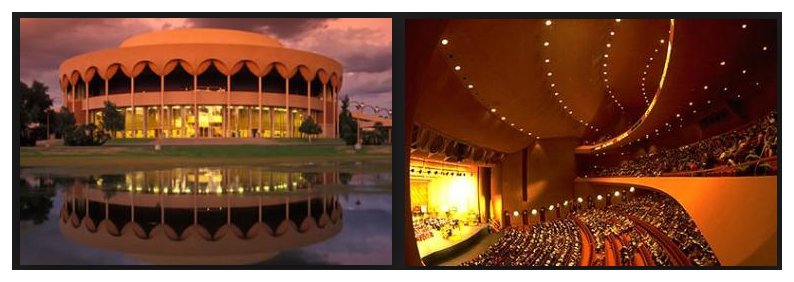
|
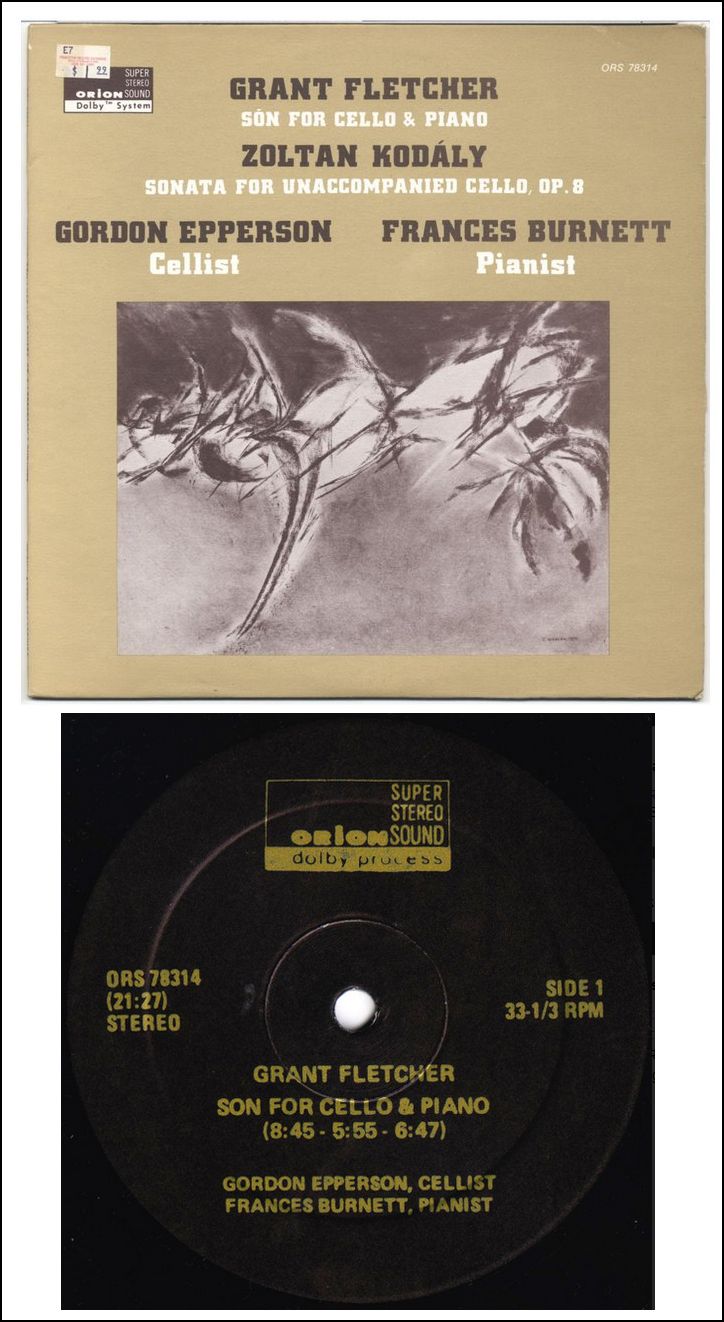
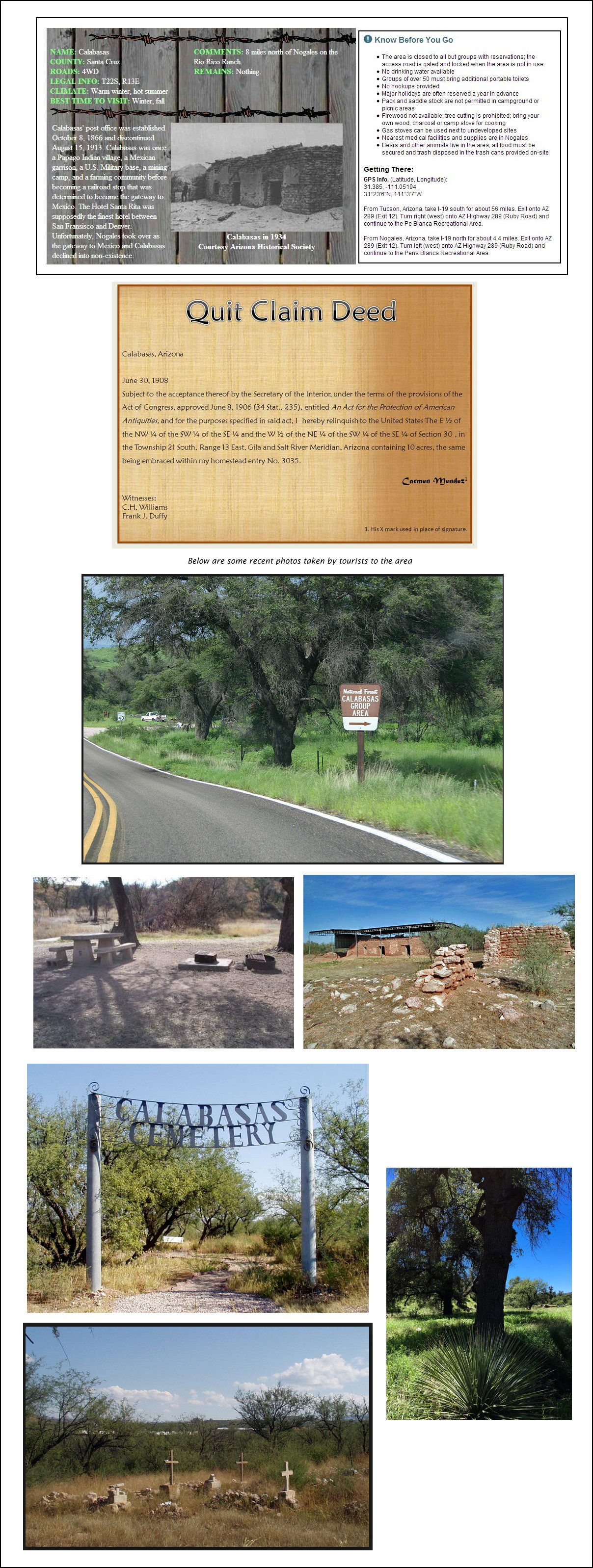
© 1987 Bruce Duffie
This conversation was recorded on the telephone on March 14, 1987. Because of the poor sound on the original recording, quotations from the interview were used during programs of his music on WNIB in 1993 and 1998. This transcription was made in 2017, and posted on this website at that time. My thanks to British soprano Una Barry for her help in preparing this website presentation.
To see a full list (with links) of interviews which have been transcribed and posted on this website, click here. To read my thoughts on editing these interviews for print, as well as a few other interesting observations, click here.
Award - winning broadcaster Bruce Duffie was with WNIB, Classical 97 in Chicago from 1975 until its final moment as a classical station in February of 2001. His interviews have also appeared in various magazines and journals since 1980, and he now continues his broadcast series on WNUR-FM, as well as on Contemporary Classical Internet Radio.
You are invited to visit his website for more information about his work, including selected transcripts of other interviews, plus a full list of his guests. He would also like to call your attention to the photos and information about his grandfather, who was a pioneer in the automotive field more than a century ago. You may also send him E-Mail with comments, questions and suggestions.